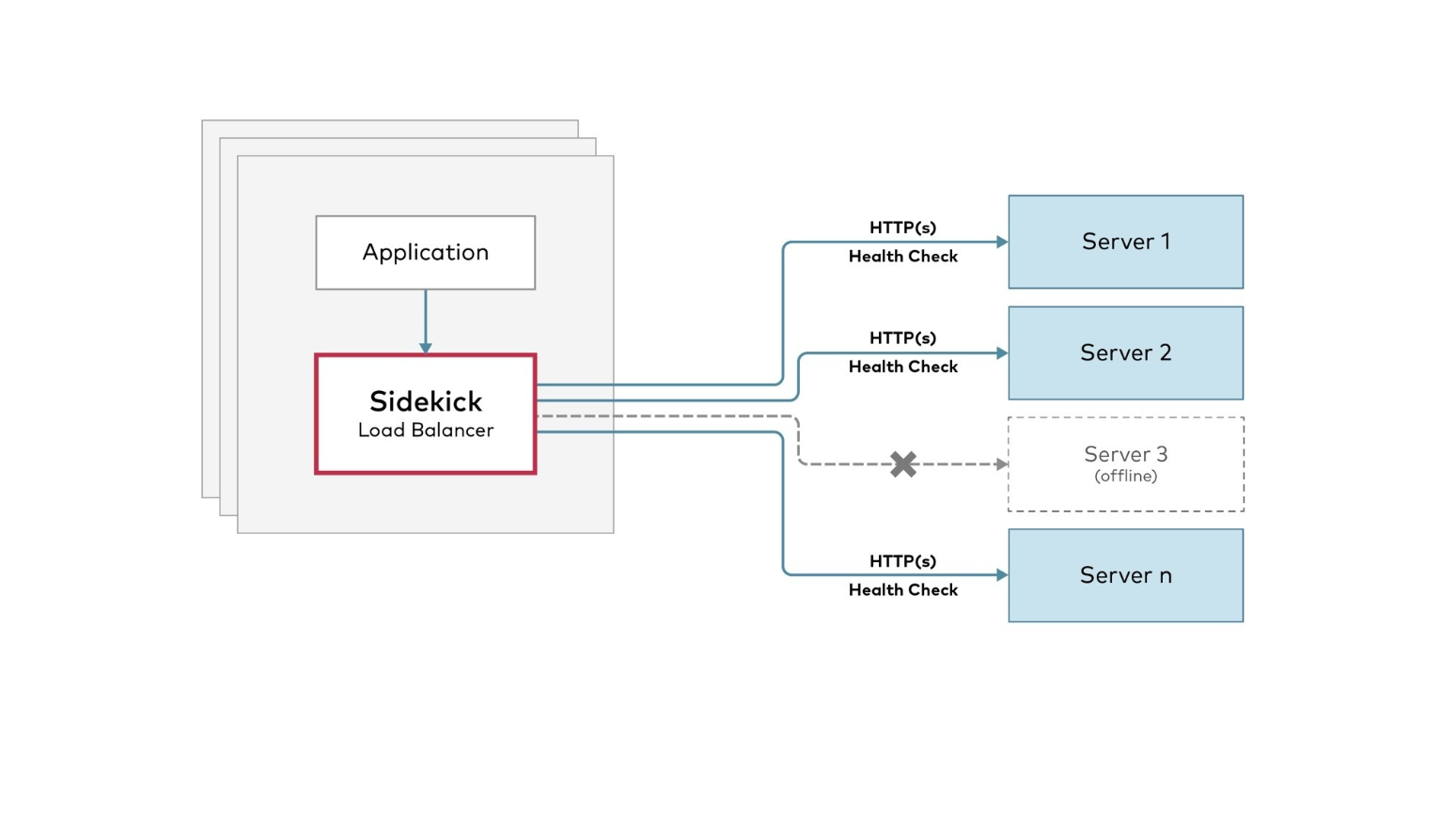sidekick is a high-performance sidecar load-balancer. By attaching a tiny load balancer as a sidecar to each of the client application processes, you can eliminate the centralized loadbalancer bottleneck and DNS failover management. sidekick automatically avoids sending traffic to the failed servers by checking their health via the readiness API and HTTP error returns.
| OS | ARCH | Binary |
|---|---|---|
| Linux | amd64 | linux-amd64 |
| Linux | arm64 | linux-arm64 |
| Linux | ppc64le | linux-ppc64le |
| Linux | s390x | linux-s390x |
| Apple | amd64 | darwin-amd64 |
| Windows | amd64 | windows-amd64 |
You can also verify the binary with minisign by downloading the corresponding .minisig signature file. Then run:
minisign -Vm sidekick-<OS>-<ARCH> -P RWTx5Zr1tiHQLwG9keckT0c45M3AGeHD6IvimQHpyRywVWGbP1aVSGav
Pull the latest release via:
docker pull quay.io/minio/sidekick:v4.0.1
go install -v github.com/minio/sidekick@latest
You will need a working Go environment. Therefore, please follow How to install Go. Minimum version required is go1.17
NAME:
sidekick - High-Performance sidecar load-balancer
USAGE:
sidekick - [FLAGS] SITE1 [SITE2..]
FLAGS:
--address value, -a value listening address for sidekick (default: ":8080")
--health-path value, -p value health check path
--read-health-path value, -r value health check path for read access - valid only for failover site
--health-port value health check port (default: 0)
--health-duration value, -d value health check duration in seconds (default: 5s)
--insecure, -i disable TLS certificate verification
--log, -l enable logging
--trace value, -t value enable request tracing - valid values are [all,application,minio] (default: "all")
--quiet, -q disable console messages
--json output sidekick logs and trace in json format
--debug output verbose trace
--cacert value CA certificate to verify peer against
--client-cert value client certificate file
--client-key value client private key file
--cert value server certificate file
--key value server private key file
--help, -h show help
--version, -v print the version
$ sidekick --health-path=/ready http://myapp.myorg.dom
Load balance across 4 MinIO Servers (http://minio1:9000 to http://minio4:9000)
$ sidekick --health-path=/minio/health/ready --address :8000 http://minio{1...4}:9000
$ sidekick --health-path=/minio/health/ready http://site1-minio{1...4}:9000 http://site2-minio{1...4}:9000
As spark driver, executor sidecars, to begin with install spark-operator and MinIO on your kubernetes cluster
optional create a kubernetes namespace spark-operator
kubectl create ns spark-operator
We shall be using maintained spark operator by GCP at https://github.com/GoogleCloudPlatform/spark-on-k8s-operator
helm repo add incubator http://storage.googleapis.com/kubernetes-charts-incubator
helm install spark-operator incubator/sparkoperator --namespace spark-operator --set sparkJobNamespace=spark-operator --set enableWebhook=true
helm install minio-distributed stable/minio --namespace spark-operator --set accessKey=minio,secretKey=minio123,persistence.enabled=false,mode=distributed
NOTE: persistence is disabled here for testing, make sure you are using persistence with PVs for production workload. For more details read our helm documentation
Once minio-distributed is up and running configure mc and upload some data, we shall choose mybucket as our bucketname.
Port-forward to access minio-cluster locally.
kubectl port-forward pod/minio-distributed-0 9000
Create bucket named mybucket and upload some text data for spark word count sample.
mc config host add minio-distributed http://localhost:9000 minio minio123
mc mb minio-distributed/mybucket
mc cp /etc/hosts minio-distributed/mybucket/mydata/{1..4}.txt
apiVersion: "sparkoperator.k8s.io/v1beta2"
kind: SparkApplication
metadata:
name: spark-minio-app
namespace: spark-operator
spec:
sparkConf:
spark.kubernetes.allocation.batch.size: "50"
hadoopConf:
"fs.s3a.endpoint": "http://127.0.0.1:9000"
"fs.s3a.access.key": "minio"
"fs.s3a.secret.key": "minio123"
"fs.s3a.path.style.access": "true"
"fs.s3a.impl": "org.apache.hadoop.fs.s3a.S3AFileSystem"
type: Scala
sparkVersion: 2.4.5
mode: cluster
image: minio/spark:v2.4.5-hadoop-3.1
imagePullPolicy: Always
restartPolicy:
type: OnFailure
onFailureRetries: 3
onFailureRetryInterval: 10
onSubmissionFailureRetries: 5
onSubmissionFailureRetryInterval: 20
mainClass: org.apache.spark.examples.JavaWordCount
mainApplicationFile: "local:///opt/spark/examples/target/original-spark-examples_2.11-2.4.6-SNAPSHOT.jar"
arguments:
- "s3a://mytestbucket/mydata"
driver:
cores: 1
coreLimit: "1000m"
memory: "512m"
labels:
version: 2.4.5
sidecars:
- name: minio-lb
image: "quay.io/minio/sidekick:v4.0.1"
imagePullPolicy: Always
args: ["--health-path", "/minio/health/ready", "--address", ":9000", "http://minio-distributed-{0...3}.minio-distributed-svc.spark-operator.svc.cluster.local:9000"]
ports:
- containerPort: 9000
executor:
cores: 1
instances: 4
memory: "512m"
labels:
version: 2.4.5
sidecars:
- name: minio-lb
image: "quay.io/minio/sidekick:v4.0.1"
imagePullPolicy: Always
args: ["--health-path", "/minio/health/ready", "--address", ":9000", "http://minio-distributed-{0...3}.minio-distributed-svc.spark-operator.svc.cluster.local:9000"]
ports:
- containerPort: 9000kubectl create -f spark-job.yaml
kubectl logs -f --namespace spark-operator spark-minio-app-driver spark-kubernetes-driver
- Health-Check: Health check is provided at the path "/v1/health". It returns "200 OK" even if any one of the sites is reachable, else it returns "502 Bad Gateway" error.




